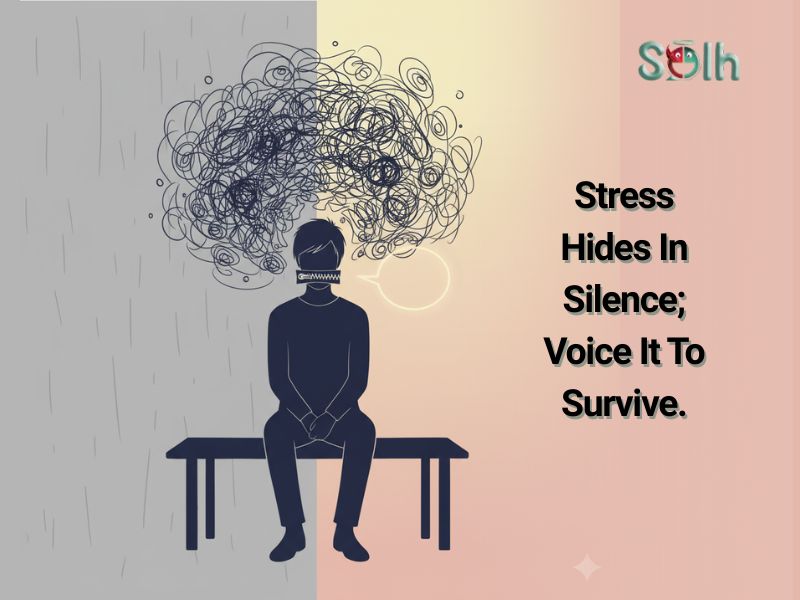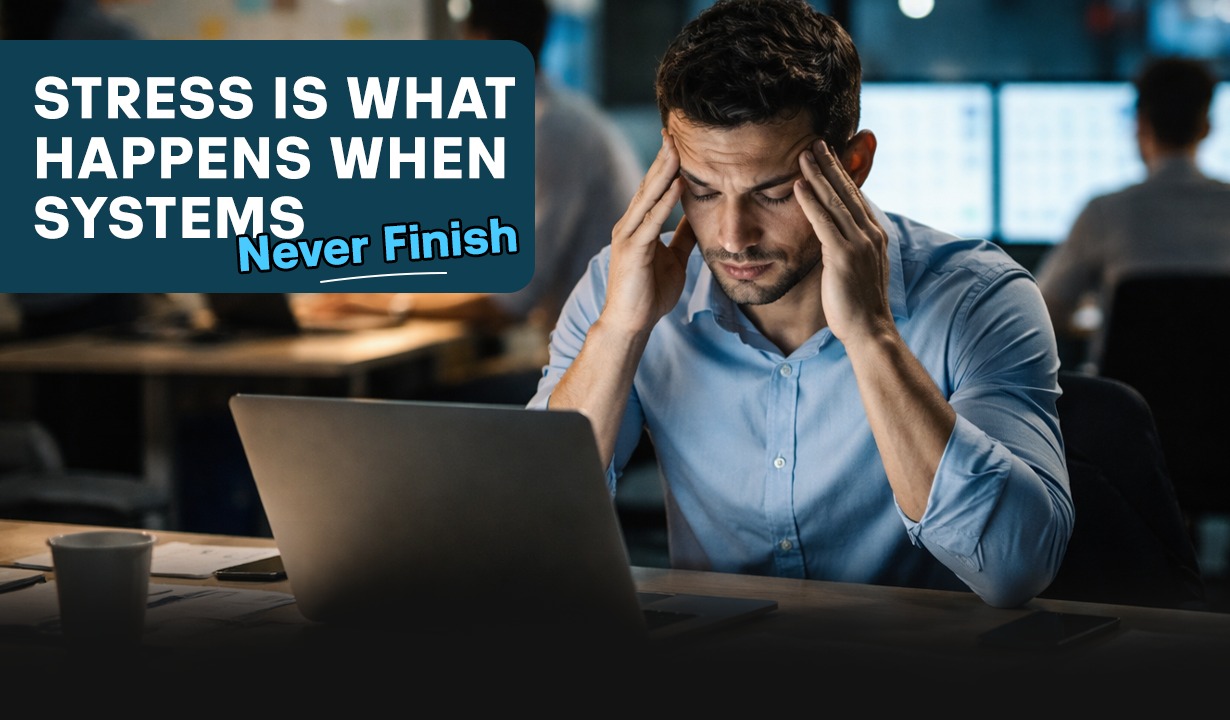Let me call it out upfront: stress thrives in silence.
You can have the best fitness plan, the fanciest diet, the most impressive CV—but if you refuse to talk about stress, you’re sitting on a ticking bomb. And when it explodes, it doesn’t just take your peace of mind. It takes your health, your career, your relationships, and sometimes, your life.
We live in a world where people can post their meals, vacations, and workout selfies online, but ask them about their stress management—and suddenly, they vanish. Silence isn’t strength. It’s denial. And denial is stress’s best friend.
The Stigma Nobody Wants to Face
Here’s the hard truth: most people would rather admit to a broken bone than to a stressed mind.
- A CEO will proudly talk about a knee surgery but never about panic attacks.
- A student will laugh about failing math but hide anxiety that keeps them awake all night.
- A father will joke about back pain but never confess that money worries are choking him.
Why? Because the moment you admit stress, society slaps you with a label: “weak.”
And nobody wants that label. Not in families where “tough love” is glorified. Not in offices where burnout is branded as “commitment.” Not in friend groups where everyone is pretending to have their shit together.
So we shut up. We fake smiles. We bury it. And slowly, stress eats us alive.
The Denial That Destroys
“I’m fine.”
The two most dangerous words in the human dictionary.
Every addict, every burnt-out employee, every anxious teenager starts with “I’m fine.”
But here’s what “I’m fine” actually means:
- I’m drowning but don’t want to scare anyone.
- I’m addicted but don’t want to be judged.
- I’m collapsing but don’t want to look weak.
Denial doesn’t erase stress. It just lets it fester until it mutates into something uglier— stress and addiction , breakdowns, chronic illness.
Stress unspoken is stress weaponized.
Why Silence Feeds Addiction
Addiction recovery begins with awareness. Addiction is never about the substance—it’s about the silence behind it.
Stress piles up. You don’t talk. You don’t release. You don’t process. So your nervous system looks for an escape.
That’s why stress and addiction are Siamese twins.
- The founder downs a drink after every meeting “to relax.”
- The student scrolls porn at midnight to numb rejection.
- The employee smokes three cigarettes in a row to “clear the head.”
- The teenager drowns in gaming because reality feels unbearable.
None of this starts with “fun.” It starts with stress, and because nobody talks about it, the addiction grows in the dark.
The Biology of Silence
Silence doesn’t just kill conversations—it rewires your brain.
How it works:
- Suppression: You feel the stress but don’t talk. Cortisol keeps building.
- Disguise: You cover it up with distractions—food, drinks, reels, games.
- Dependency: The distraction becomes a compulsion. You need it every time stress rises.
- Addiction: Now the “solution” is the problem. You’re hooked.
This is how stress management prevents silence from turning into slavery.
Society Rewards the Lie
Here’s the messed-up part: society applauds silence.
- A leader who admits burnout is seen as “incapable.”
- A student who confesses anxiety is told “stop overthinking.”
- An employee who admits panic is advised to “take a break” (while deadlines pile up).
We glorify the people who “never complain.” But those people aren’t stronger—they’re ticking time bombs.
The absence of conversation is not resilience. It’s rot.
Talking Is Not Therapy. It’s Survival
Let’s be clear—I’m not telling you to sit in a circle, hold hands, and sing positive songs about stress awareness.
Talking about stress isn’t about dramatics. It’s about survival.
When you talk, three things happen:
- You name the demon. And when you name it, you stop pretending it doesn’t exist.
- You reduce shame. You realize others are fighting the same battles.
- You block the loop. Stress coping strategies intercept stress spirals before they turn into addiction.
Talking is the first weapon. Not therapy, not medication, not self-help hacks. Talking. Because silence is the disease, and conversation is the cure.
How Solh Breaks the Silence
At Solh Wellness, we built the entire ecosystem on this truth: silence kills, and connection heals.
- Solh Buddy – A private, stigma-free space where you can express what you’ve been holding in.
- Smart AI Dashboard – Organisational stress management system to track burnout risk and build a healthier work culture.
- Guided Plans – Structured 7–14 day stress management tools to manage work, money, relationships, overthinking step by step.
- Prarambh Life – For when silence has already turned into addiction. Digital rehab for alcohol, nicotine, porn, gaming, or phone dependency.
Solh doesn’t sell “positivity.” We give you the tools to break silence before silence breaks you.
The Final Truth Shot
Stress is not the problem. Silence is.
Stress will always exist—exams, bills, deadlines, heartbreak, failure. But the moment you lock it inside, it multiplies into burnout, addiction, or collapse.
Talking about stress awareness is not weakness—it’s rebellion.
If you can brag about your KPIs, your vacations, your fitness, your startup—then you can damn well talk about stress.
Because silence is suicide. And conversation is survival.
At Solh, that conversation begins now.
FAQ’S
Q1. How does silence make stress worse?
Silence keeps the nervous system in a constant state of suppression. Stress hormones like cortisol continue to rise, which leads to emotional numbness, compulsive coping behaviors, and eventually mental or physical breakdown. Silence doesn’t remove stress — it amplifies it.
Q2. What is the link between stress and addiction?
Stress and addiction are closely connected. When stress is unprocessed, the brain seeks fast relief through substances or behaviors like alcohol, smoking, gaming, porn, or phone usage. Over time, this relief becomes dependency, creating a loop of stress → addiction → more stress.
Q3. Is talking about stress the same as therapy?
No. Talking about stress is not therapy — it is survival. Open conversation helps name the problem, reduce isolation, and stop stress from turning into addiction or burnout. Therapy may come later, but talking is always the first step.
Q4. Why do people avoid talking about stress at work?
Because stress is wrongly associated with weakness. Many workplaces reward silence and endurance, branding burnout as commitment. This culture discourages honest conversations, leading to disengagement, quiet quitting, and sudden breakdowns.
Q5. How can organisations break the culture of silence around stress?
Organisations can break silence by acknowledging stress as a systemic issue, not an individual failure. Proactive stress monitoring, leadership-led conversations, and organisational stress management systems help identify burnout early and create psychological safety.
Q6. Can talking about stress prevent burnout?
Yes. Early conversations about stress help detect warning signs before performance drops or health collapses. When stress is addressed early, it prevents chronic burnout, disengagement, and attrition.



